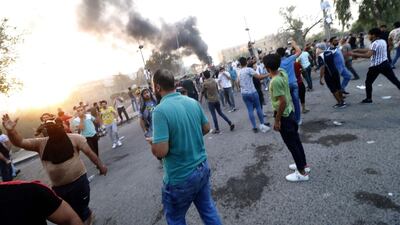About 150 protesters gathered at the main entrance to Iraq's giant Nahr Bin Omar oilfield in Basra on Sunday amid growing unrest in southern cities over poor public services and corruption.
The protesters threatened to break into the field if the government did not respond to their demands to improve basic services and address their complaints over Basra's drinking water, which residents say is undrinkable due to high salt levels.
"We will not allow the oilfield to operate unless we get clean water. No services, no jobs and now no clean water. We are fed up," said Hassan Ali, a protest organiser.
Officials at the oilfield, operated by state-run Basra Oil Company, said production was running normally. Nahr Bin Omar produces about 44,000 barrels per day, they said.
Basra health officials said more than 17,000 people had been treated for illnesses caused by polluted drinking water in recent weeks.
On Friday, hundreds of protesters stoned and tried to break into Basra's provincial government headquarters, demanding better public services and an end to pervasive corruption.
Other protesters gathered at a main road to the east of Basra leading to a border crossing with Iran, trying to prevent trucks from moving, customs and police officials said.
Oil exports from Basra account for more than 95 per cent of Iraq's state revenues. Any potential disruptions to production could severely affect Iraq's limping economy.
Iraqi political blocs are attempting to form a coalition government after a May 12 parliamentary election tainted by allegations of fraud. The new parliament will convene for the first time tomorrow after the election results were finally ratified following a partial recount.
_______________
Read more:
Basra governor wants oil firms to build water plants
Basra health crisis: 17,000 admitted to hospitals for water poisoning
Basra politician presses demand for autonomy
_______________

